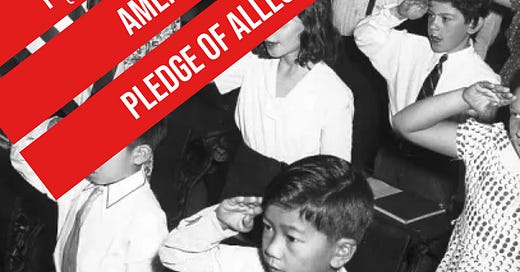The people of Jerusalem, whether they chose to or not, take on a pledge of allegiance.
Led by Nehemiah, this chapter describes how they solemnly sign a new version of their covenant with each other - and with God. There have been historical moments like this before - led by Joshua and later on by King Josiah, but there are some unique features here, including what the pledge or covenant is called. The text does not refer to this covenant as ‘b’rit’, the usual Hebrew name - but rather ‘Amanah’ , a rare word that appears only one more time in the entire Hebrew Bible —in the next chapter of Nehemiah.
The word Amana is made up of the same root as Amen - a Hebrew word that made its way around the world’s sacred vocabulary. It comes from the Hebrew root א-מ-נ, which stands for what’s solid, steadfast, enduring, trustworthy, or faithful.
The Hebrew word for religious faith comes from the same root: Emunah. What these people are signing is a declaration of faith, a pledge of allegiance - and a binding contract for the ages:
וּבְכׇל־זֹ֕את אֲנַ֛חְנוּ כֹּרְתִ֥ים אֲמָנָ֖ה וְכֹתְבִ֑ים וְעַל֙ הֶֽחָת֔וּם שָׂרֵ֥ינוּ לְוִיֵּ֖נוּ כֹּהֲנֵֽינוּ׃
“In view of all this, we make this pledge and put it in writing; and on the sealed copy [are subscribed] our officials, our Levites, and our priests.
Nehemiah 10:1
The leaders sign the scroll. But what is it - and what is it not?
Jacob Wright explains that
“This document is not the founding document for a liberation movement or a charter to stake out a claim in a new country. They long to be free, but in the meantime they come together to corporately commit themselves to the Torah and to support their own institutions (above all, their temple).”
The Amana combines terms for better social conditions, religious norms and theological demands. It’s a pledge of solidarity to ease their harsh conditions under Persian rule and local wealthy leadership.
The social laws include an insistence on keeping the Sabbath - the oldest labor law in the book - and also the Sabbatical year, meant to give farmers and the land a break and a chance to recharge and remit debts. Front and center is the repeated requirement to only marry within the tribal boundaries and not assimilate with foreigners - who are the people of the land. While this may have more to do with Nehemiah’s struggles with Judah’s elites who mix politics and family ties with the local elites and not prioritizing Judean loyalty and binds - this is one of the continued tropes of this period. Like Ezra, but with more force, Nehemiah will continue to advocate for the removal of Non-Judeans from the community, although it’s also not clear whether this attempt was successful or not.
But perhaps the most important factor of this pledge was the structure of taxation. Each household was to provide ongoing support for the spiritual center - both in terms of money, food and materials for the constant upkeep of the sacrificial system.
Nehemiah comes up with an innovation here - apparently he likes lotteries, and it may be a Persian thing. That is how it is decided which of the Judean households will be responsible for which of the months in which firewood is needed to keep the temple fires burning:
וְהַגּוֹרָל֨וֹת הִפַּ֜לְנוּ עַל־קֻרְבַּ֣ן הָעֵצִ֗ים הַכֹּהֲנִ֣ים הַלְוִיִּם֮ וְהָעָם֒ לְ֠הָבִ֠יא לְבֵ֨ית אֱלֹהֵ֧ינוּ לְבֵית־אֲבֹתֵ֛ינוּ לְעִתִּ֥ים מְזֻמָּנִ֖ים שָׁנָ֣ה בְשָׁנָ֑ה לְבַעֵ֗ר עַל־מִזְבַּח֙ יְהֹוָ֣ה אֱלֹהֵ֔ינוּ כַּכָּת֖וּב בַּתּוֹרָֽה׃
“We have cast lots among the priests, the Levites, and the people, to bring the wood offering to the House of our God by clans annually at set times in order to provide fuel for the altar of YHWH our God, as is written in the Torah.
Nehemiah 10:35
Robert Alter comments in The Hebrew Bible, paying attention to what is and what is not in this document:
“This system of casting lots for who is to bring wood for the altar fires is an innovation. It is noteworthy that this list of items in the solemn commitment by the the people is highly selective: it begins with the ban on intermarriage, then the sabbath, followed by the sabbatical year, with all the stipulations afterward--by far the majority of items--related to the maintenance of the temple cult. This was, of course, the great moment of renewal after the rebuilding of the Temple, but one may detect here evidence of Ezra’s priestly agenda. It is certainly surprising that nothing of the ethical injunctions of the Torah and its calls for social justice appears in the ‘amanah.”
With the pledge signed, and the rules and regulations in place to secure a solid social structure, Nehemiah turns to a few more tasks before he returns to the Persian mainland.
There’s one more lottery awaiting the people of Jerusalem - a city with walls but too small a population. It’s about to get a boost - whether the people like it or not.
Below the Bible Belt: 929 chapters, 42 months, daily reflections.
Become a free or paid subscriber and join Rabbi Amichai’s 3+ years interactive online quest to question, queer + re-read between the lines of the entire Hebrew Bible. Enjoy daily posts, weekly videos and monthly learning sessions. 2022-2025.
Become a Paid Subscriber? Thank you for your support!
#Nehemiah #BookofNehemiah
#hebrewbible #כתובים #Ketuvim #Bible #Tanach #929 #נחמיה #עזרא #ספרנחמיה#שיבתציון #labshul #belowthebiblebelt929
#Nehemiah10
#TheSecondTemple #persianempire #Yehud #rebuildingJerusalem #Ezra-Nehemiah #Amana #Brit #pledgeofallegiance #communalcovenant #Covenant #lottery #firewood #Amen
#peace #prayforpeace #nomorewar #stopthewarnow




I continue to learn lots! On my own, I would never have noticed all these details.